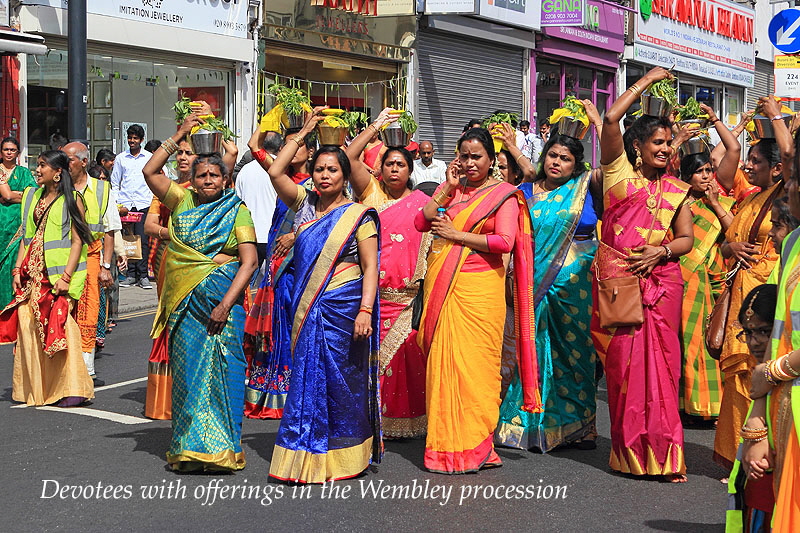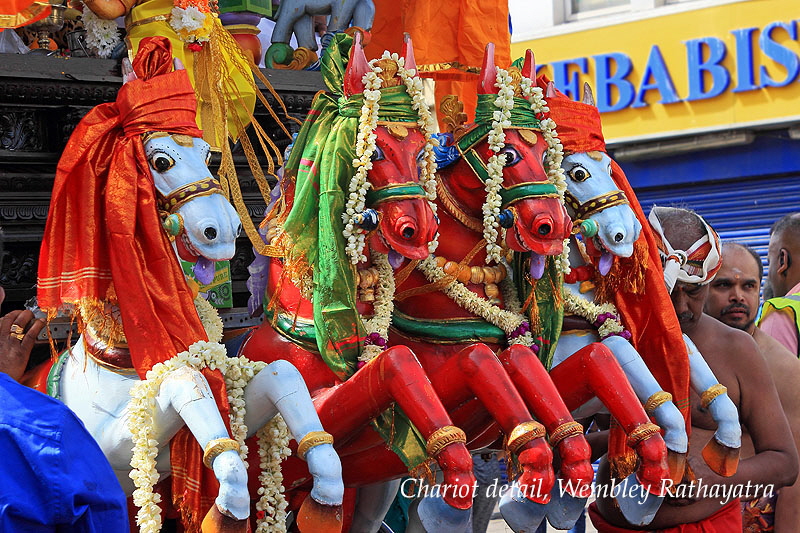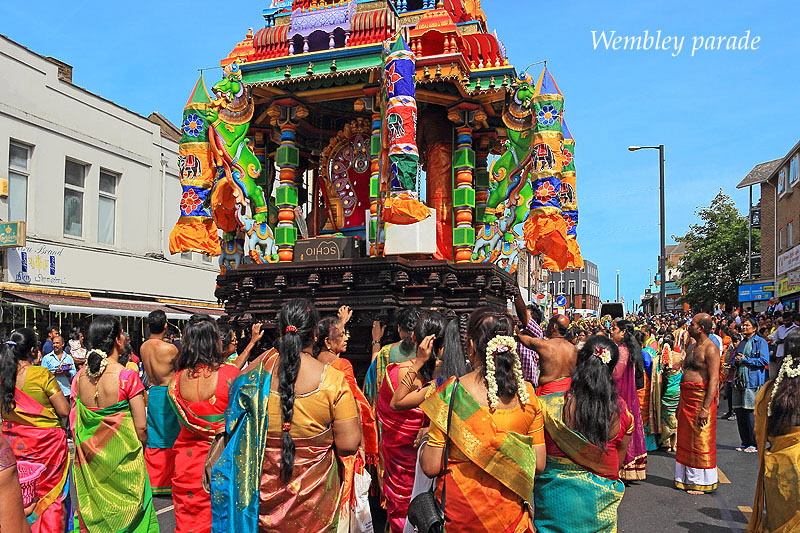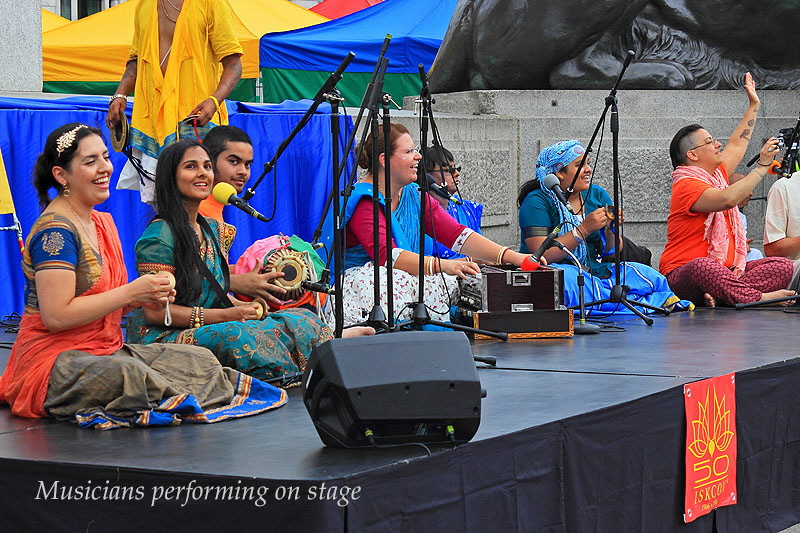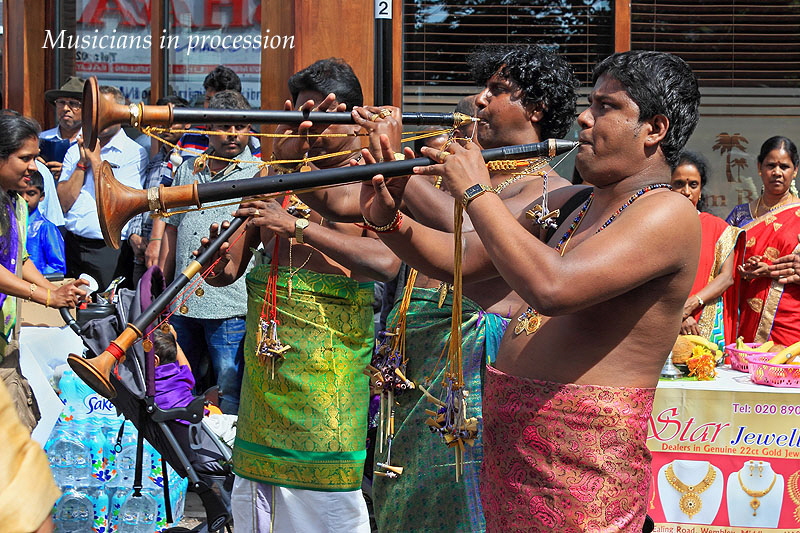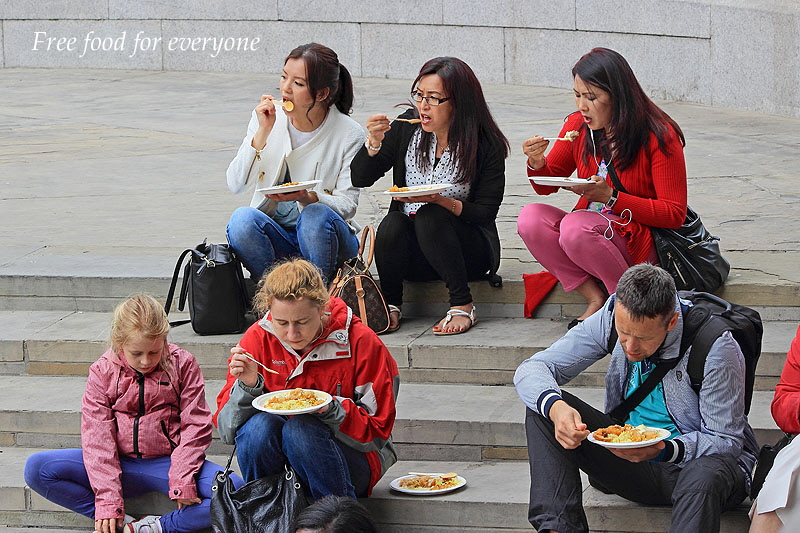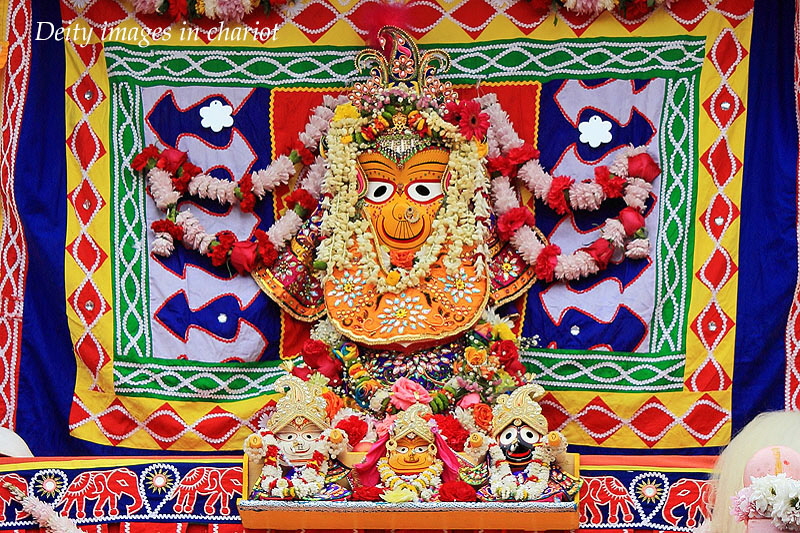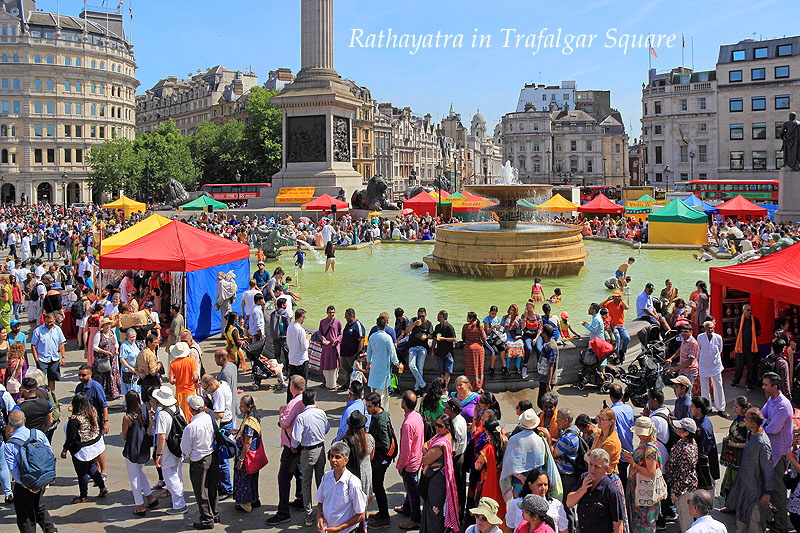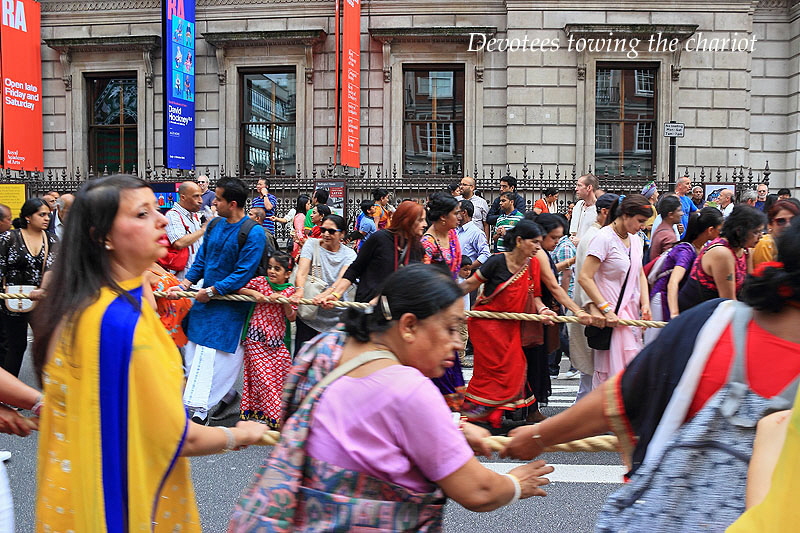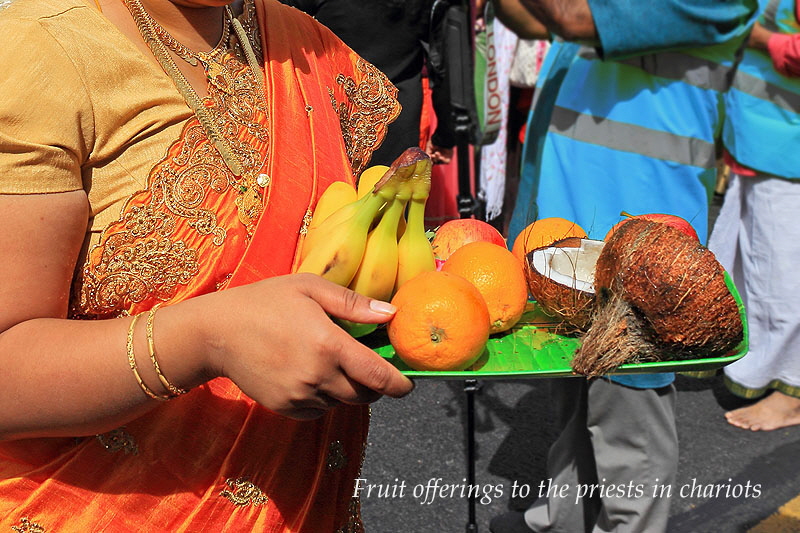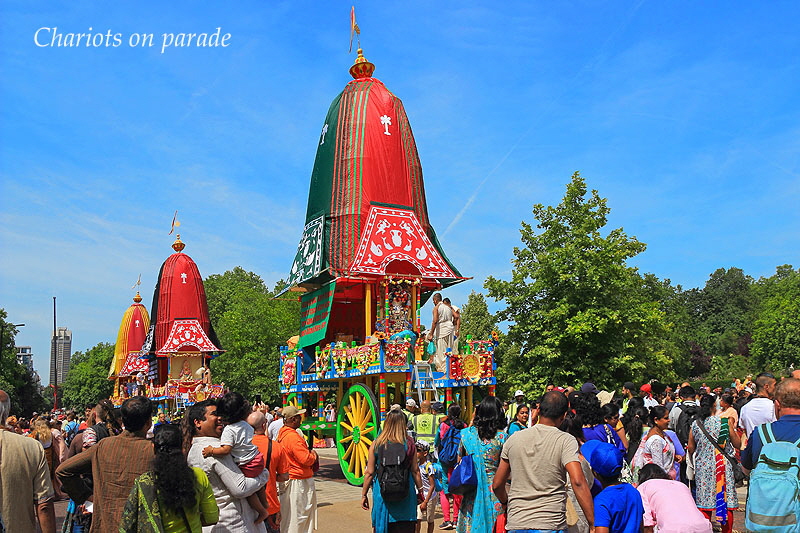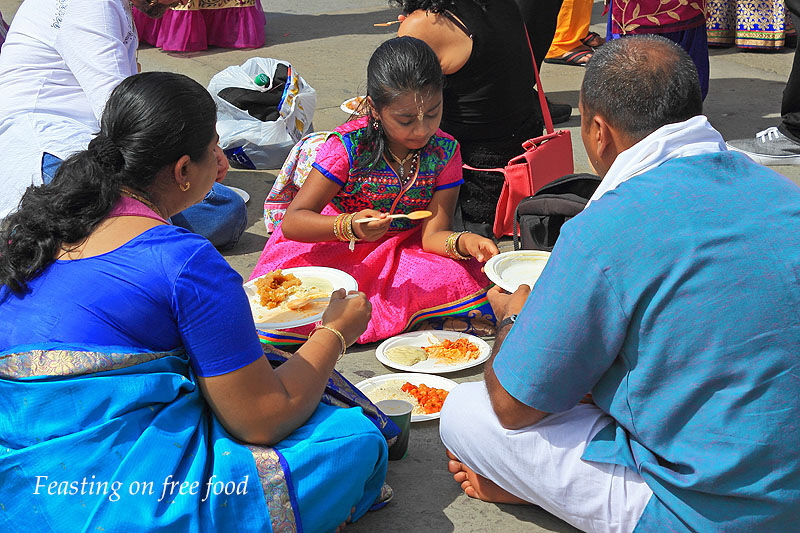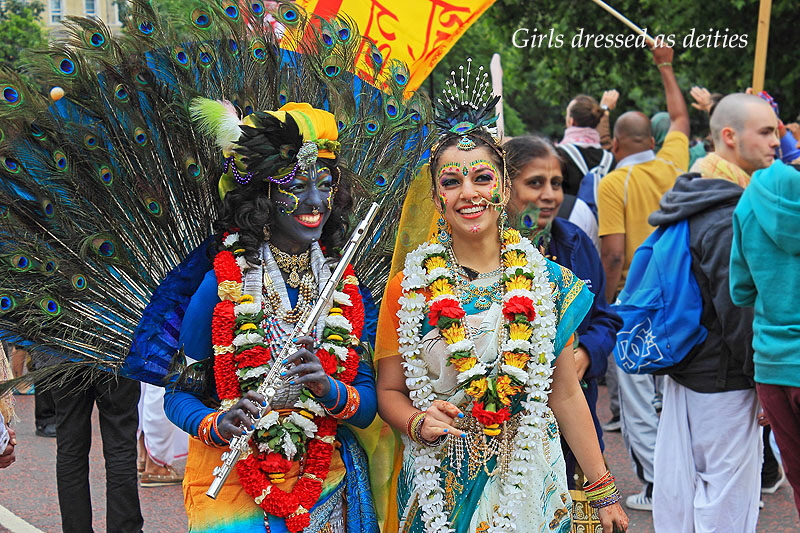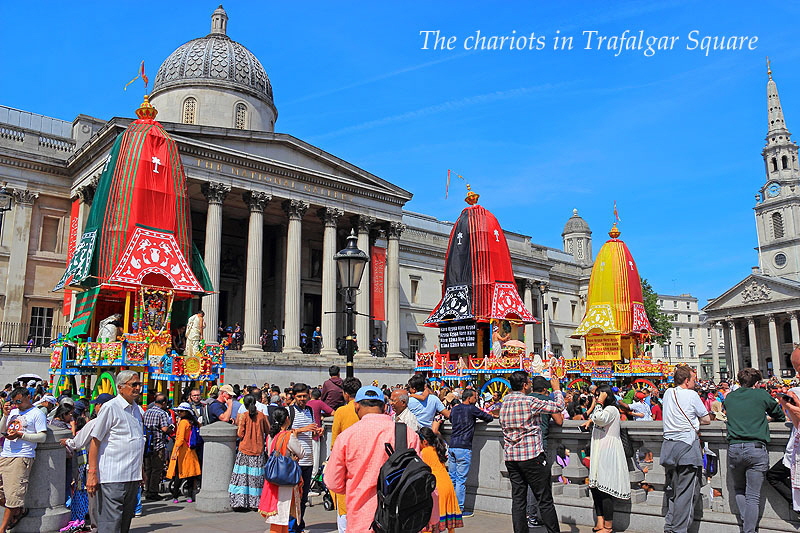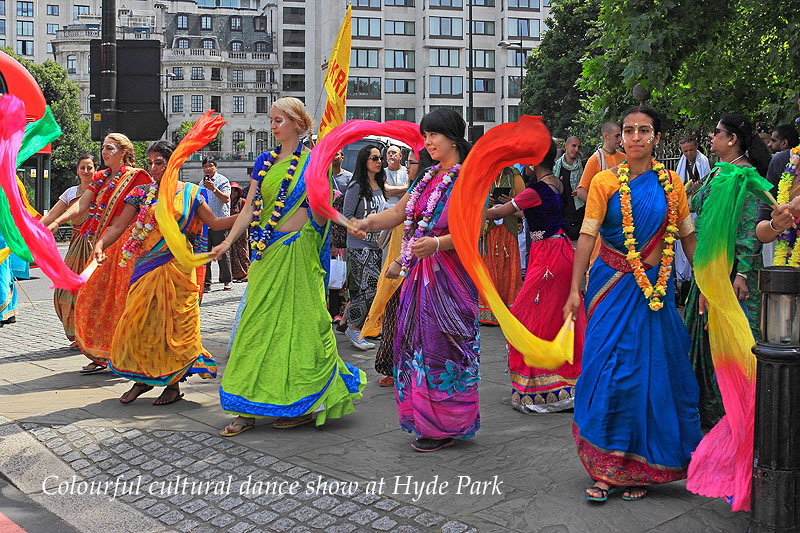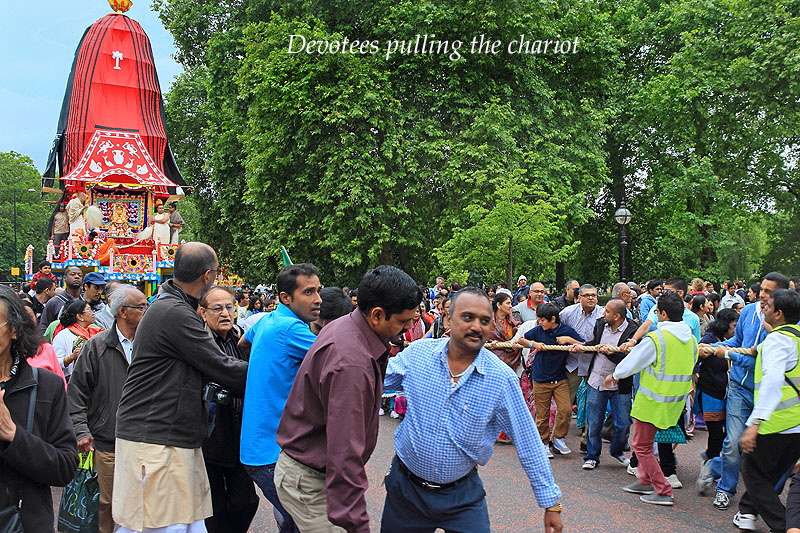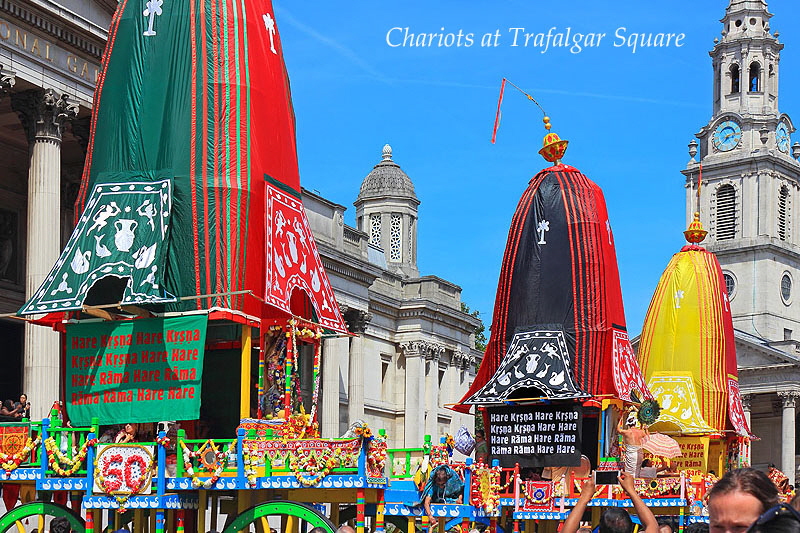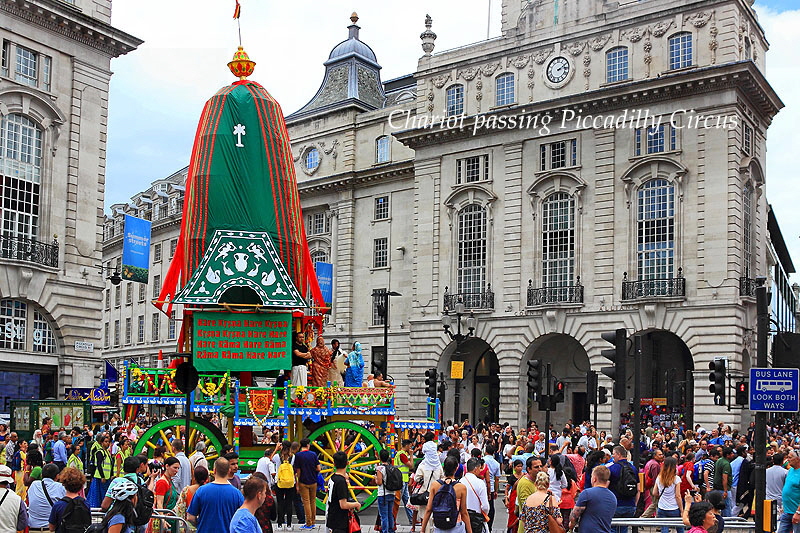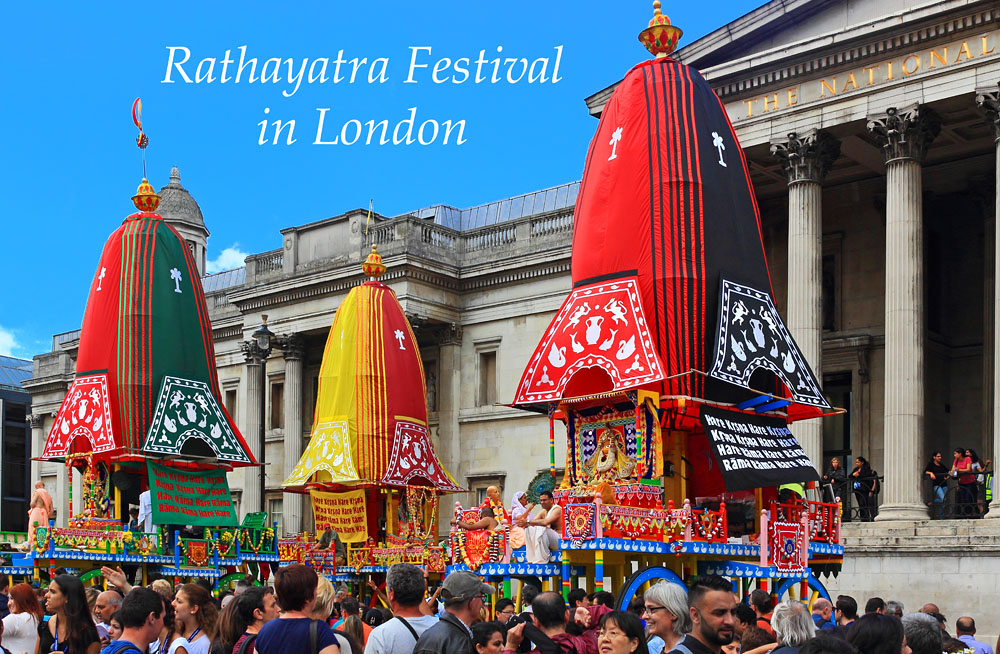
Join in, chant, feast, and be happy
One of the many advantages of living in London is its diverse ethnicity and thus enjoying an insight into the multitude of cultures, religions and of course festivals. London’s Trafalgar Square is usually the hub for many of the capital’s events, although smaller versions of a particular festival will also be held in various boroughs of the city.
One of the most vibrant, and colourful of all is the Rathayatra Hindu Festival held during the summer months.
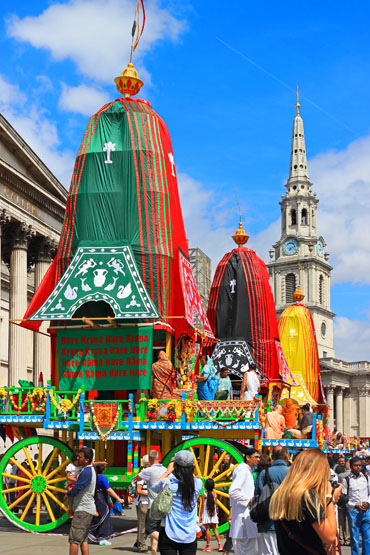

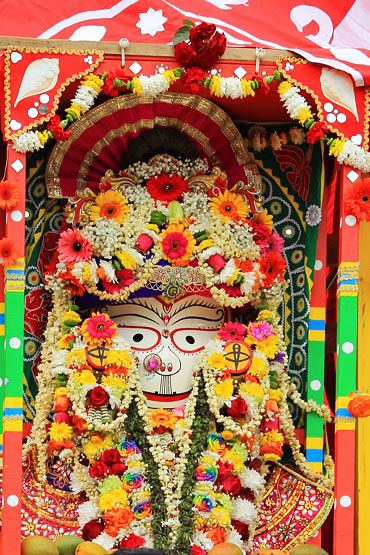
Image of goddess Subhadra on chariot
Ratha- Yatra meaning ‘chariot festival’ originated hundreds of years ago in the city of Orisa, West Bengal, in Eastern India. It is a joyous celebration of the Hindu god Krishna, who is worshipped as Lord Jagannatha, and the event is unique to the region. Three enormous wooden brightly painted chariots, carrying deity figures of Jagannatha, Baladeva and Subhadra form a slow procession through the city. Attached by thick long ropes, they are pulled by hand by dozens of devotees and pilgrims. Alongside, the grand procession is accompanied by musicians, singers and dance performers.
Incidentally, the English word ‘juggernaut’ was derived during the British colonial days in India. Christian missionary Rev Buchanan on encountering the large towering carts of Lord Jagannatha in the parade took a negative approach branding it a ‘dangerous religious cult’. Thankfully, such ignorance does not prevail today.
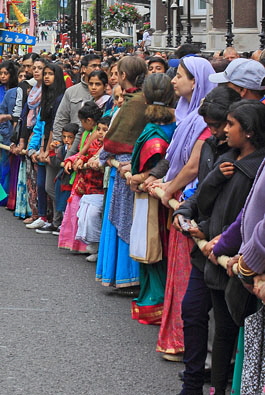
Devotees with rope to pull the chariot
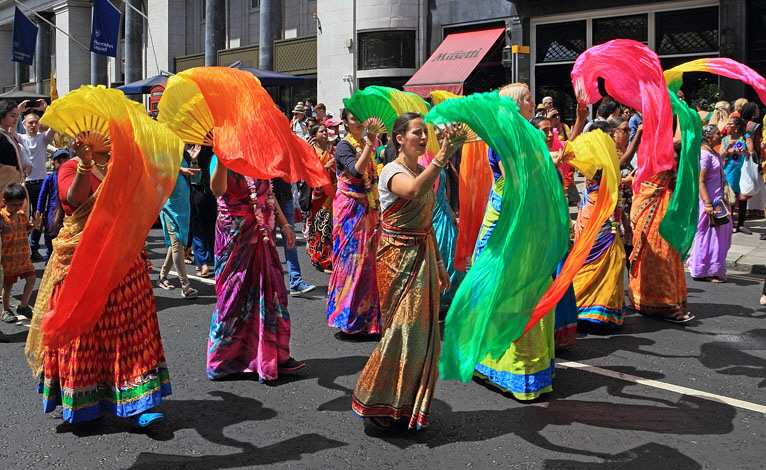
The reason for the festival is explained in the narration of legends that go back thousands of years. Several explanations are given. One is that Lord Krishna heard how his close devotees lamented during his absence and their love for him in separation. Consumed with emotion, his hair began to stand on its end, eyes opened wide and filled with tears. His arms and legs contracted and attained a posture of spiritual ecstasy. Seeing Lord Krishna in this state, he was joined by his brother Baladeva and sister Subhadra. And together the trio represented total the bliss of that period in their lives. The festival depicts Lord Krishna in longing to reunite with his devotees, rides in a grand chariot in a procession to return and meet with them.
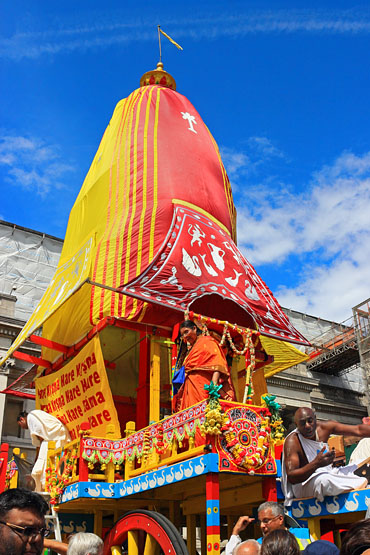
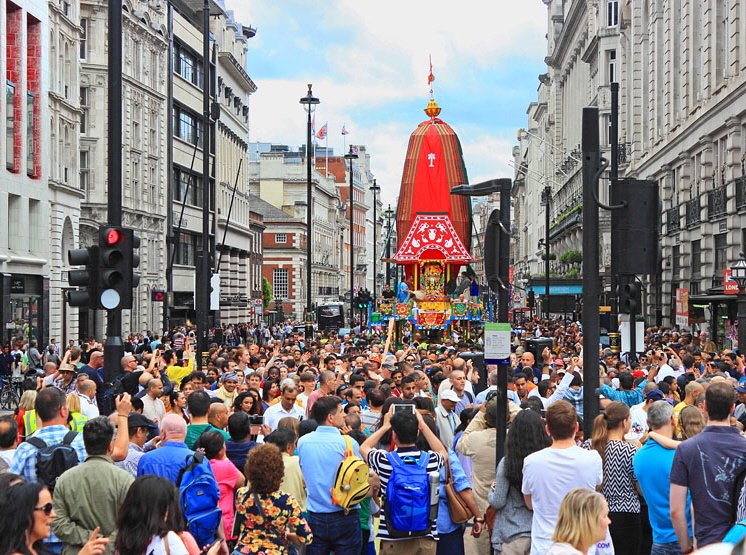
The procession passing through Piccadilly Circus
Hindus, along with Hare Krishna devotees join together in a parade in a similar fashion to celebrate this happy annual occasion. Today it takes place in many countries around the world, and within those countries, in various cities also. Each year, in the UK, it is held in Brighton, Leicester, Cardiff, London, and Dublin in Ireland. Apart from visiting the main event in Trafalgar Square for several years, I have also enjoyed one of the smaller yet spectacularly colourful local parades in Wembley.
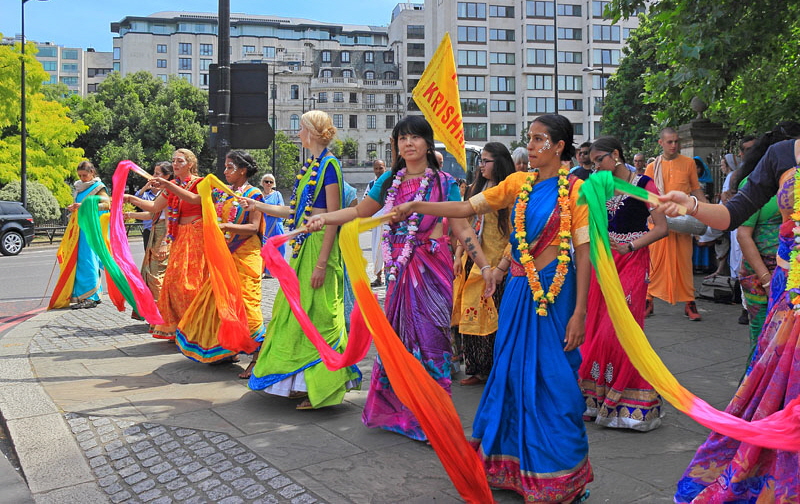
Colourful and elegant dance performances
In London, around noon, the procession begins in Hyde Park Corner, passing by Park Lane, and proceeds along Piccadilly towards Trafalgar Square. Come early to Hyde Park Corner (by the south side of Hyde Park), and enjoy some cultural dance performances, before the procession begins. Attired in multi-coloured garments and saris, it’s a mesmerising show to watch before joining the procession. The pilgrims and devotees are a riot of colour, performing more dance routines along the way. Some even adorn themselves with distinguishing make-up to resemble versions of deities. Visitors and tourists who gather around become one mass of heads as they eventually converge towards Trafalgar Square. Once there, the three chariots are parked opposite the National Gallery.
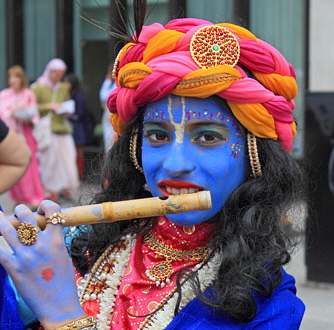
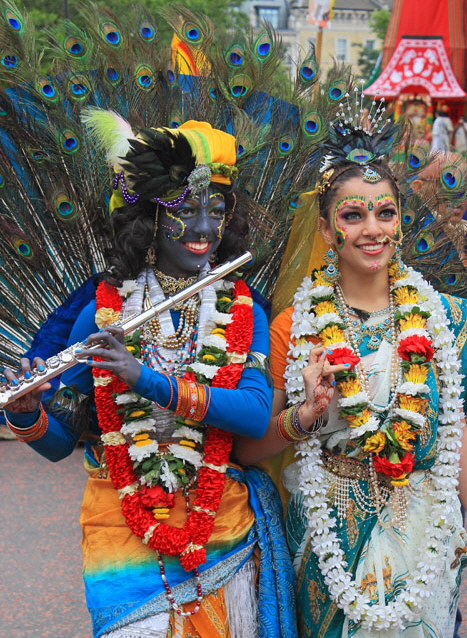
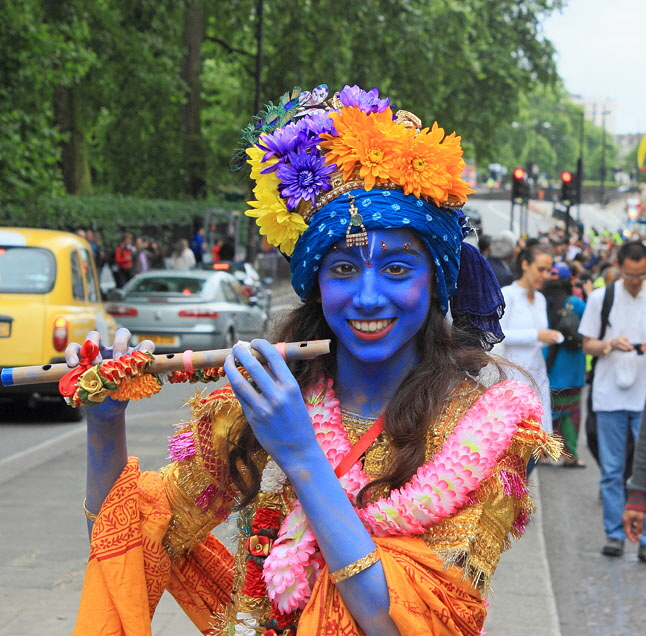
Prayers with fruit and floral offerings are made to the priests on the chariots and in return receive blessings. Parents lift their babies up to the priest, to be anointed and blessed. Others worship around the chariot and pray in silence.
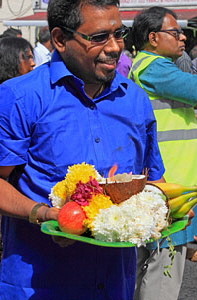
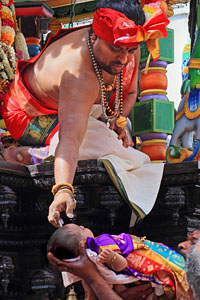
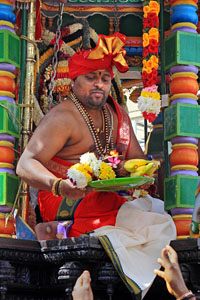
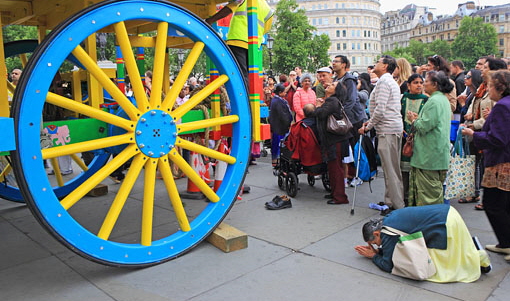
At Trafalgar Square, is a feast of free food which is not to be missed! Several stalls are erected to serve delicious vegetarian food. Items such as dhal curry, rice, vegetables, flatbread (chapati), and yoghurt-based drinks like lassi and chaas are plenty. Other stalls also provide bottled water.
Stalls and crowds at Trafalgar Square
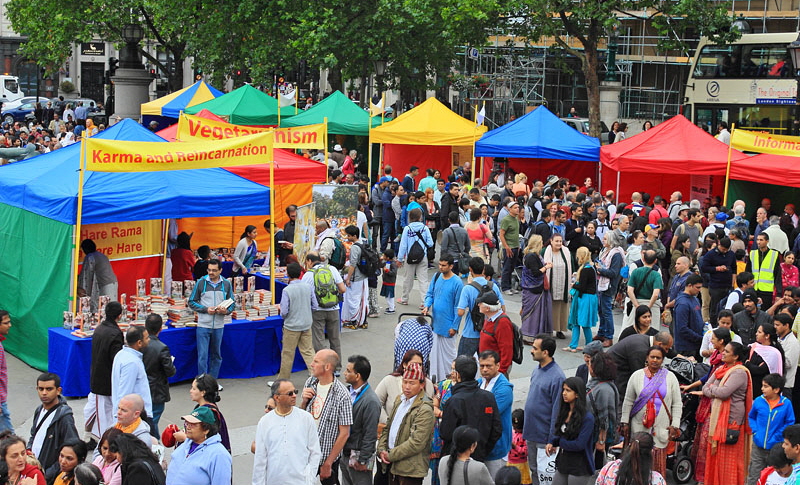
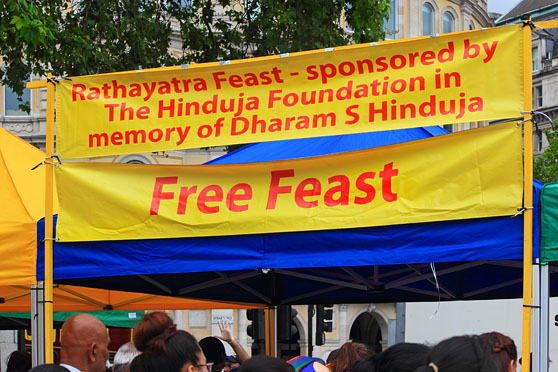
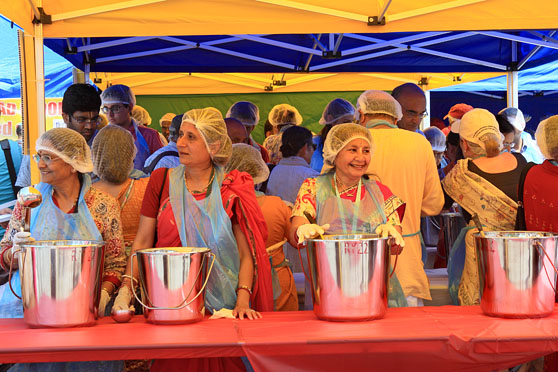
Volunteers ready to serve delicious food, at Trafalgar Square
There are several other stalls that sell books and religious objects. The centre stage is set up for musicians to perform and give speeches. The festivities continue late into the evening, with more music, dramas and philosophical teachings, and kiritan (story reciting).
And throughout the festivities, there are visual signs and the sound of the chanting of the mantra:
Hare Krishna, Hare Krishna, Krishna Krishna, Hare Hare
Hare Rama, Hare Rama, Rama Rama, Hare Hare
The three words mean Hare (energy), Krishna and Rama (incarnation of the Vishnu, god of Hinduism). Followers believe that chanting has the power to free one from fear and stress, eliminate negative emotions, and grant inner peace.
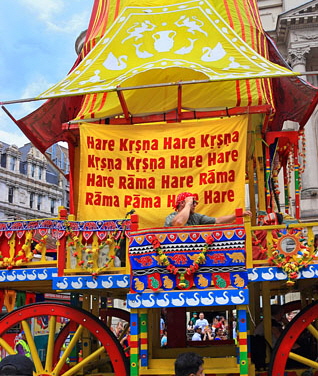
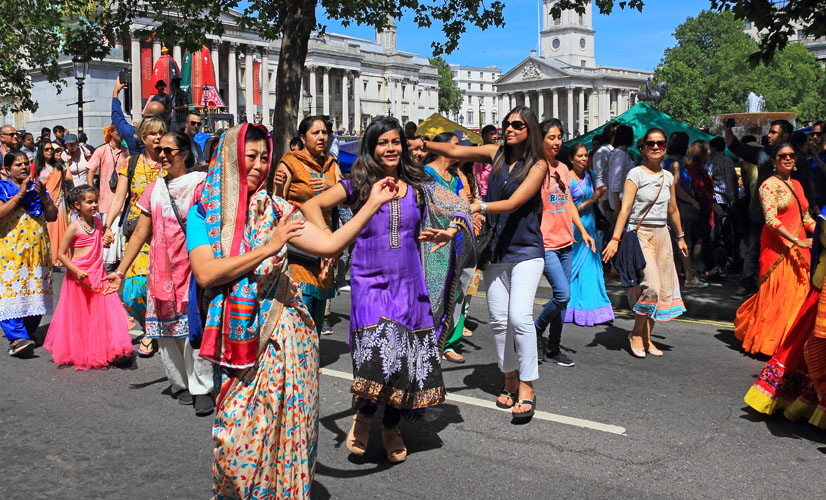
Rathayatra festival is certainly a day of rejoicing and peace for the young and old alike. No one is excluded. Everyone, believer or not is welcome to join in the happy occasion and encouraged to take part in the chanting.
18 images here ©JAYTRAVELPHOTOS
© COPYRIGHT notice. The images on this site are for viewing only.
To purchase any, for personal or commercial use, please contact us at jaytravelphotos@aol.com
___________________________________________________________________________________________________________________________________________
